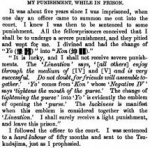Clarity,
Office 17622,
PO Box 6945,
London.
W1A 6US
United Kingdom
Phone/ Voicemail:
+44 (0)20 3287 3053 (UK)
+1 (561) 459-4758 (US).

Hi all,
I've been considering 1.6,
and how line 1 and line 6 are sometimes
'out of the sphere of activity of a given hexagrams general meaning'.
Fan Yao (did Bradford coin that?) is the corresponding line in the changed hex, after the line changes in the primary hex. The two lines share some qualities that give them a sort of character kinship.
Hi, Moss:...
Could someone provide the various meanings of kang4, And a perhaps point to where it can be read in a context, elsewhere, outside of Yi? ...
 in some valid combinatory sequences the new line at the base must be a broken line
in some valid combinatory sequences the new line at the base must be a broken line  ||<, say, H.44 (THE QUEEN)
||<, say, H.44 (THE QUEEN)亢龍 kànglóng: "Arrogant dragon."
A metaphor for a man in a high position who has been corrupted by his high status and no longer has the support of the people or his retainers.
http://www.buddhism-dict.net/cgi-bin/xpr-dealt.pl?4e.xml+id('c4ea2-9f8d')


Thanks everyone.
So it seems to be something like:
In line 1 the Dragons strength is too weak to act.
In line 6 the Dragons strength is too excessive/harshly/forceful
If we stick to the image of Icarus, then I think the third meaning fits best. If you do not know your limits, or do not accept them, you will have unavoidable misfortune. Not from arrogance, but from recklessness. It are often the kind people, and not the arrogant people, who have to learn their lessons like this.
Clarity,
Office 17622,
PO Box 6945,
London.
W1A 6US
United Kingdom
Phone/ Voicemail:
+44 (0)20 3287 3053 (UK)
+1 (561) 459-4758 (US).